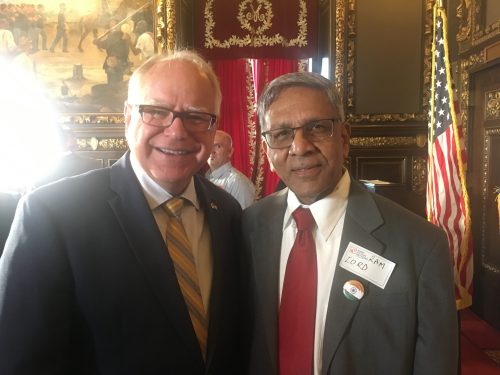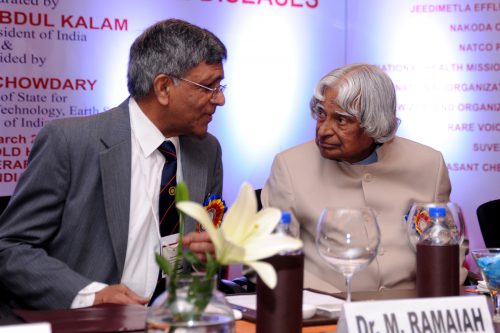Ramaiah Muthyala, Ph.D., MBA
As a young boy growing up in India, Ramaiah Muthyala, Ph.D., MBA, experienced something that would forever change his life, imprinting on his heart the desire to help people living with rare diseases.
Dr. Muthyala watched a neighborhood acquaintance struggle with what was likely Cerebral Palsy. No one ever told the young Ramaiah what had happened to the boy next door; he just knew the sadness and longing he saw in this neighbor’s eyes. The boy lived with his widowed mother, who adhered to orthodox beliefs.
This child was ostracized because his rare disease made him somehow “different.” He did not attend school; he did not play with his peers; he did not build friendships. Some parents instructed their children to stay away from this young boy who lived in prison created by the community because of the rare unknown condition.
Ramaiah Muthyala carried this young boy’s memory with him throughout a lifetime of education, global travel, and professional accomplishment. He earned PhDs from the University of Sagar, India and the University of East Anglia in Norwich, United Kingdom, and an MBA from the University of St. Thomas in St. Paul, Minnesota. He spent time in the pharmaceutical industry and academia yet could never forget his childhood neighbor.

If you are a member of the rare disease community in the United States, you know rare diseases impact 8-10% of the population or approximately 25-30 million Americans. Now take 8-10% figure and consider India’s population, over 1.3 billion. As shocking as it is to know that 25-30 million Americans live with a rare disease, it’s mind-boggling to consider that rare diseases may impact well over 100 million citizens of India.
The diagnostic odyssey for citizens of India presents unique challenges. Some of these include lack of a common language among the subcontinent’s 29 different states, over 60% of the rural population, and differences in culture, food, and traditions that may seek medical care of disease no one has ever seen, extremely difficult, if not impossible.
After spending over twenty years working for 3M Company, Ramaiah joined the faculty at the University of Minnesota, college of pharmacy. It was here that he first began researching rare diseases, and with his childhood neighbor always in his heart and mind, he decided to do something to make a difference for the millions living with rare diseases in India.
Dr. Muthyala became part of the University of Minnesota’s Center for Drug Design and then the Center for Orphan Drug Research. He soon started asking more questions about rare diseases. Initially, no one understood his motivation to learn more about rare diseases and the people living with and dying from rare diseases. Sixteen years ago, very few people in his home country knew about rare diseases. Fewer still thought Dr. Muthyala’s drive to support rare disease offered any real value.
It didn’t take long for others to start noticing Dr. Muthyala’s passion for studying rare diseases. In 2005, he created the Indian Organization for Rare Diseases (IORD), a nonprofit incorporated in India and the United States. Initially, Dr. Muthyala felt his work still wasn’t making a dent; few people shared his passion for making Rare Disease study, advocacy, and awareness a priority. Dr. Muthyala said, “Sometimes you need a little bit of luck.” Luck may have had a small part in the development of IORD, but its tremendous success should be attributed to the determination and perseverance of its founder. Today, the organization features 12 Board Members and another 10-member Advisory Board from around the globe.

2015 proved to be a remarkable year as Dr. Muthyala organized a conference where for the first time, the former president of India, Dr. A.P.J. Kalam became a spokesperson for the rare disease’s community and got the attention of policymakers and public alike. In 2016, a Minnesota Symposium on Rare Diseases, in collaboration with the Indian Consulate General, Chicago, University of Minnesota, was organized. The State Senators, Representatives, researchers, doctors, and patients highlighted the importance of international collaborations. Dr. Muthyala began capturing the attention of pharmaceutical companies based in India; they realized business opportunities existed to support the millions of Indians living with rare diseases. Rare disease experts from Europe, Australia, and Canada also joined Dr. Muthyala to understand patient needs and industry partnerships better.
Through many crucial and well-attended educational programs, Dr. Muthyala continues to work with the Indian government to develop a national health policy for rare diseases. He hopes that eventually, he will reach his long-term goal and create a dedicated department for rare diseases in India. Dr. Muthyala, in addition to his contributions to the people of India, being a resident of Minnesota, played a crucial role in the formation of the rare diseases advisory council (RDAC) to the state of Minnesota.
Through it all, two common themes continually drive Dr. Muthyala’s work. They are first and foremost the question “What benefits the patient the most” and secondly, the concept “I am not alone.”, meaning although a person may think they are the only one with their disease, they are never alone, they have a ready-made community thanks to the eternal passion and compassion of one Dr. Ramaiah Muthyala. And that is what makes him truly a Rare Disease Difference Maker®.
